Last updated: 11 July 2023
Did you know that located just a mere 2 hour drive from London is a castle which is the site of old Roman, Norman, and English history?! Welcome to Pevensey Castle, home to the landing site of William The Conqueror and his army before they marched to the infamous Battle of Hastings in October 1066!
Pevensey Castle is also the site of a former Roman Saxon Shore Fort which existed for 600 years before the William landed and it’s defensive walls still stand today!
We first visited Pevensey Castle a few years ago and it captured my imagination then for multitude of reasons. I felt there was something so special about standing on the site of Roman history from the 5th century, to be gazing at the remains of the imposing Roman walls, and feeling a connection to the past. Then there’s also the realisation that I was standing in the same place where William, Duke of Normandy, and his army once took shelter before marching the 10 miles to the battleground (today the site of Battle Abbey) to face King Harold and his military for the English Crown.
How can a visit to Pevensey Castle not capture your imagination?!
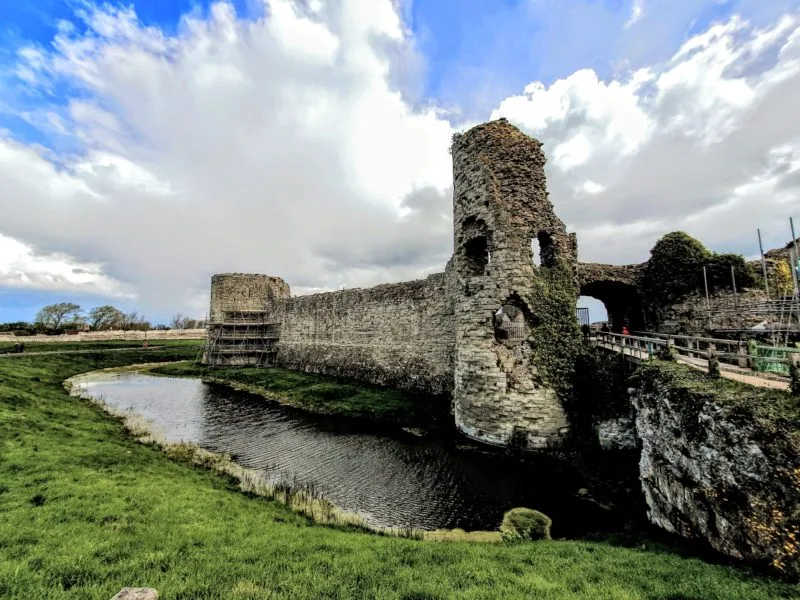
Where is Pevensey Castle?
Pevensey Castle is located in the county of East Sussex, in the south of England. It’s accessible from London via a 2 hour-ish train otherwise you can do what we did and drive. It’s about a 2 hour drive from East London.
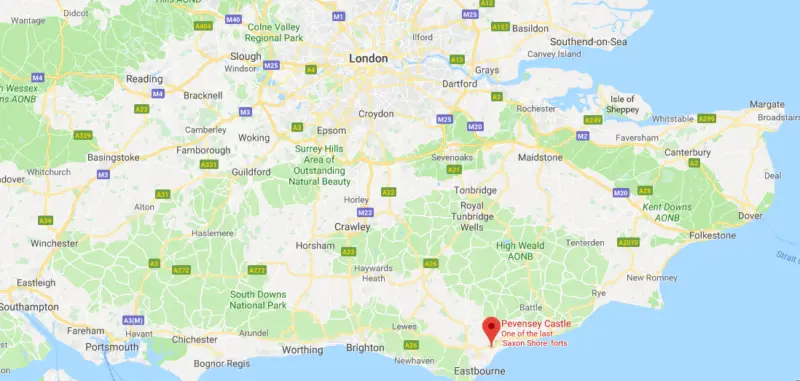
Driving
If you’re planning on hopping in the car and heading south from London then you’re likely going to take the A2, M25, and A21 roads. It’s relatively straightforward drive and you can expect to encounter some never-ending road works. A typical sight on UK roads. Parking is located outside the front of Pevensey Castle but is not included in the English Heritage membership. However, it’s only £2 all day and is operated under a Pay & Display system.
Train
If taking the train is more your thing then start your journey at Victoria station and take Southern rail direct to Pevensey and Westham station and then it’s about a 20 min walk to Pevensey Castle. Just a couple of things to keep in mind, check TFL or Google Maps for interruptions to your journey, just in case. And the other thing is that the train to Pevensey and Westham station runs hourly so plan your day accordingly.
Pevensey Castle History
You didn’t think I’d write a post about a medieval castle and not include a section on the history did you?? Here’s some historical context for you to make your visit even better.
It’s incredible to think that a fortification has existed on the site of Pevensey Castle for over 1600 years! In its first incarnation, it was Pevensey roman fort (technically it was a one of a series of Roman Saxon Shore Forts) called Anderida built in the early half of the 4th century (between 292-330 AD) to provide protection from marauding Saxon pirates.
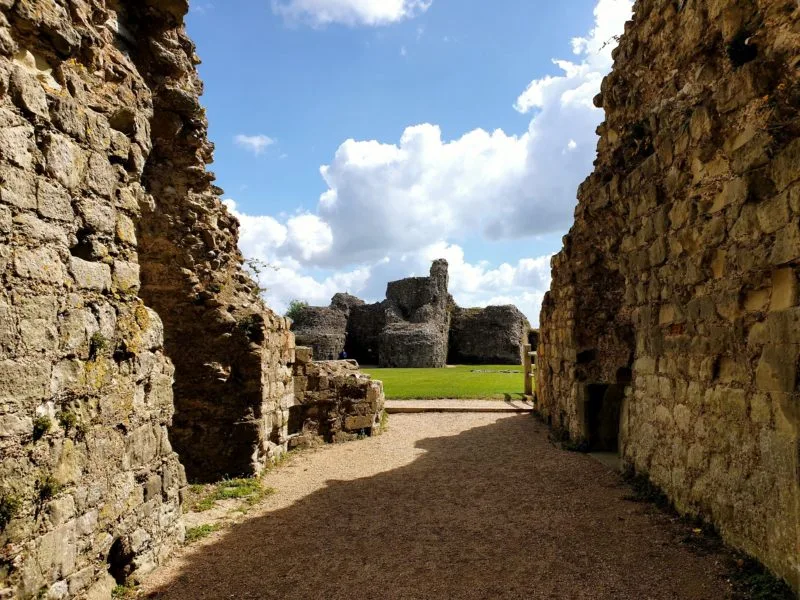
Historical intrigue alert! There’s a theory that the fort could have been built on the orders of Carausius, a Roman General who commanded a fleet in the English Channel, who rebelled against Rome in 286 AD and crowned himself Emperor of Britain (and northern France). You want to know how this theory came about? Roman coins were found showing Carausius as Emperor! Not surprisingly he was assassinated.
At that time of construction, the fortress would have sat on the coastline however the landscape has changed over time and silted up to the point where the coast is now one mile away.
Love Exploring Castles?
Read More: 11 Castles You Can Explore on a Day Trip from London
Did you know that the Romans left Britain in 410 AD and the Normans didn’t arrive until 1066 which leaves a gap of about 650 years for which there is very little historical information?! It’s during this period that the Anglo Saxon Chronicles, a collection of manuscripts updated by various monasteries across the country (to record important events) specifically mentioned Anderida when it was besieged in 491 AD by the Saxons who “slew all the inhabitants; there was not even one Briton left there”
William the Conqueror landed in Pevensey Bay on 28 September 1066 and built temporary defences and shelter for his troops before marching the 10 miles to battle with King Harold for the English crown. The Battle of Hastings, the most important battle in English history, took place on the grounds now known as Battle Abbey in the nearby town of Battle. One of the most influential historical “documents” which tells the story of the Battle of Hastings is the Bayeux Tapestry, created in the years following, can be visited in the town of Bayeux France.
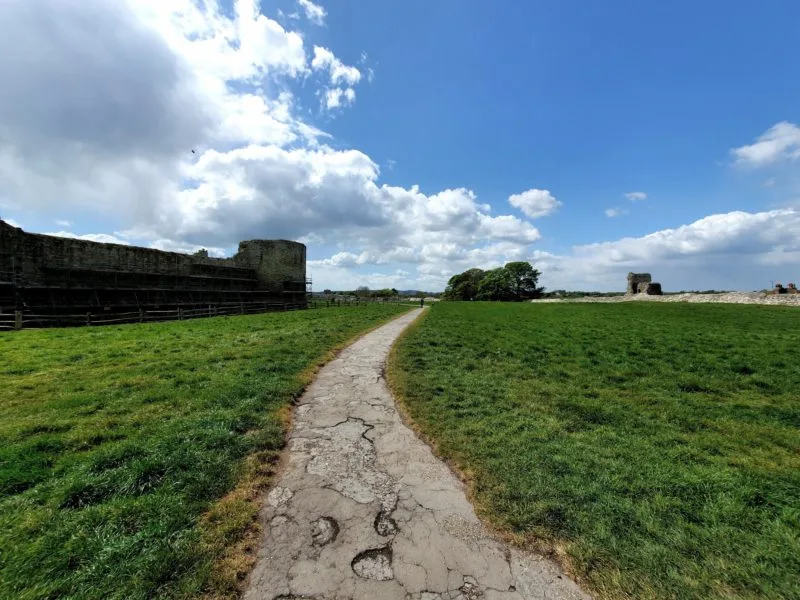
Following William’s victory and ascension to the English throne, the area of Sussex was split into specific areas called Rapes and then distributed to his close friends and allies. The Rape of Pevensey was granted to William’s half brother, Robert, Count of Mortain.
It was Robert who was likely responsible for the first permanent defences, the creation of the inner and outer bailey, and the re-fortification of the Roman walls.
In the centuries that followed, Pevensey Castle passed through many hands and it continued to be developed, which included the replacement of timber and earth defences with stone buildings, the construction of the The Keep and Gatehouse which likely date from the 12th century. The castle’s present curtain wall and towers date from the mid-13th century under the construction work ordered by Peter of Savoy.
Falling into a state of ruin under the Tudor reign but having a brief return to importance under the threat of the Spanish Armada which saw the installation of cannons, one of which remains within the castle grounds today.
The final role of Pevensey Castle as a location of key strategic importance was during the Second World War where once again the defences were reinforced, new modern defences installed (more about that to follow below) and troops from England, Canada, and the United States were stationed in barracks within the castle walls.

The large stone boulders, which can be seen in the south tower, were excavated from the moat. These were thrown at the castle during the sieges of the middle ages. The use of a Trebuchet hurled these 135 kg (300 lb) missiles towards the castle where they burst upon impact. The boulders on the Inner Bailey lawn, however, were found in and around the castle grounds during excavation and likely that they were stockpiled rather than fired at the castle.
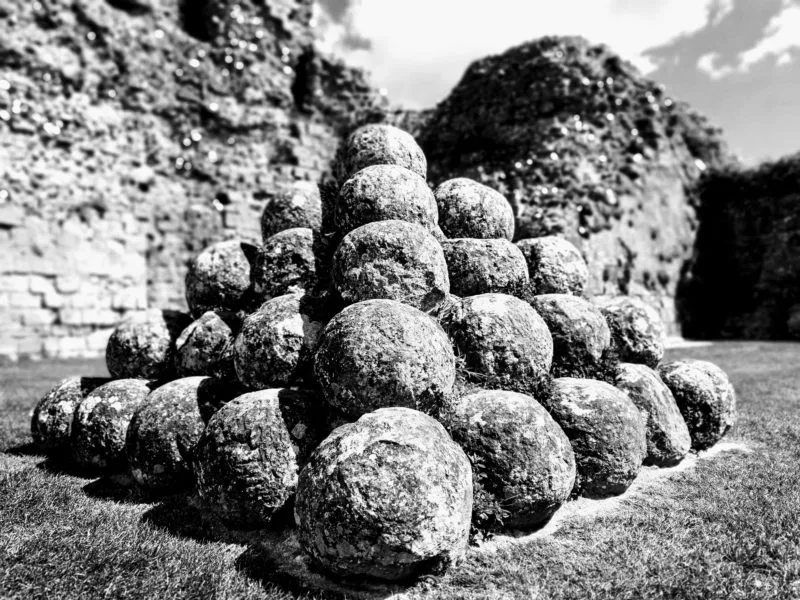
What to Expect from a Visit?
From the outside, the castle curtain walls are dramatic and definitely make for some lovely photos but the real story doesn’t really unfold until you cross the main entrance and enter the castle.
The moment you walk through the entrance, through the Outer Bailey and under where the Portcullis would hang above your head (that’s the large wooden gate with pointed teeth used to keep unwanted visitors out), then that’s where the castle ground reveal themselves to you and you realise it’s MUCH larger than the exterior walls let on.
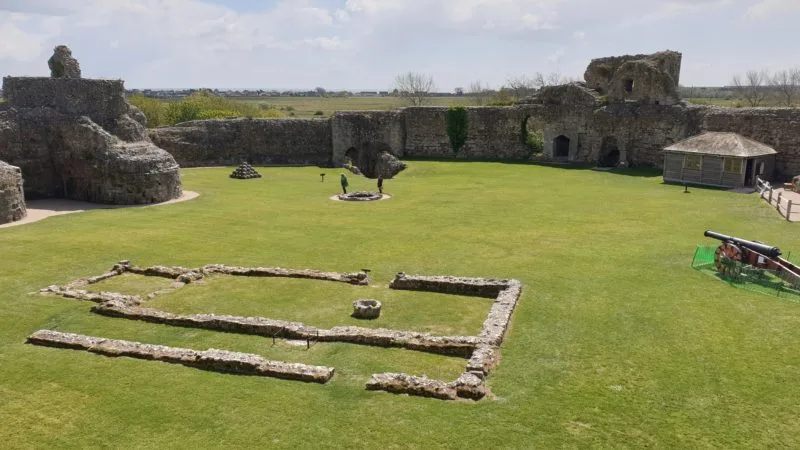
The first port of call is the ticket office where you pay the entry fee and collect your audio guides. Note to self, TAKE THE AUDIO GUIDE. You’ll miss out on half the story of Pevensey Castle if you don’t take it! One of our favourite things to do when exploring a castle is to take along our own headphones so we can plug into the audio guide which allows us an extra hand to take photos or take notes. The only downside of the Pevensey Castle guide is that there’s no external audio jack which means you need to hold it to your ear for the duration of your visit but at least the play/pause button works ok.
Follow the instructions on the audio guide and it will take you through the Dungeon, Gatehouse, Inner Bailey, The Keep, South Tower, Postern Gate, East Tower, North Tower, and Tower Walls.
During our visit the amount of visitors ebbed and flowed, especially given the amount of time we spent there, but the good news is that the castle grounds are large enough to give you your own space when exploring, no one likes trying to explore with the crowds. One good tip is to be aware that the majority of visitors generally visit each section of the castle for a few minutes at a time so if you’re there when it’s busy then give it about 10 min and you’ll probably have that section of the castle to yourself.
Russell’s Recommendations
Roman Walls
Take a moment before you enter Pevensey Castle and look out over the existing Roman walls and let the fact that these have stood in this place since the 5th century which makes them over 1500 years old! Simply incredible.
Inner Bailey
Stand in the middle of the Inner Bailey and take a 360 degree video or panoramic photo and take in the view. It’s just so impressive.
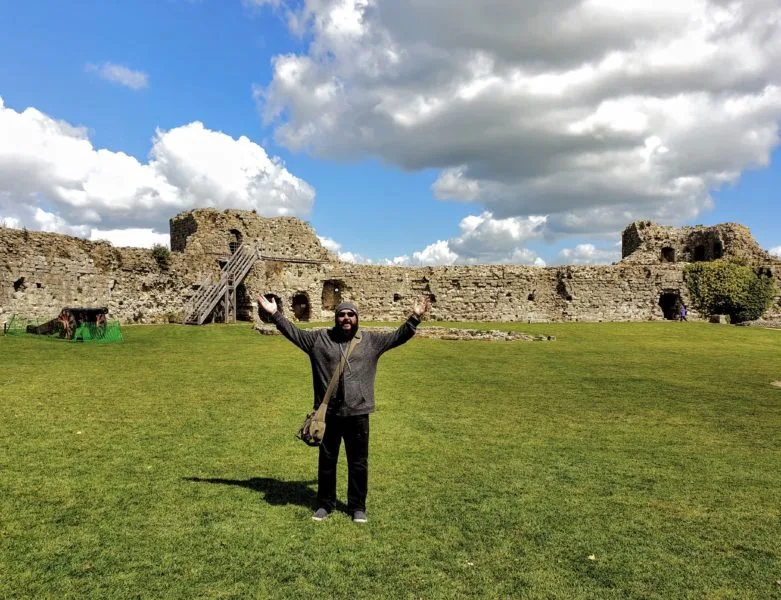
Exhibition
There’s a section of Pevensey Castle dedicated to exploring the changing landscape of the castle grounds, the Roman history, the Norman invasion, and the history of the first castle built on the grounds.
Spending time in the Exhibition space was one of my favourite parts of the castle because it’s there where the historical context is learned which helps with appreciating every other part of the castle. Also, head upstairs to learn about the four sieges which took place between 1088 and 1400.
WWII Defences
Pevensey Castle is not only home to Roman and Norman history, it’s home to modern English history too. Following the fall of France in 1940, the decision was made to ramp up the defences against possible invasion, the new defences included the installation of pillboxes for machine gun posts. One of the pillboxes is still visible when visiting the castle take a walk around the back of The Keep and the below will reveal itself
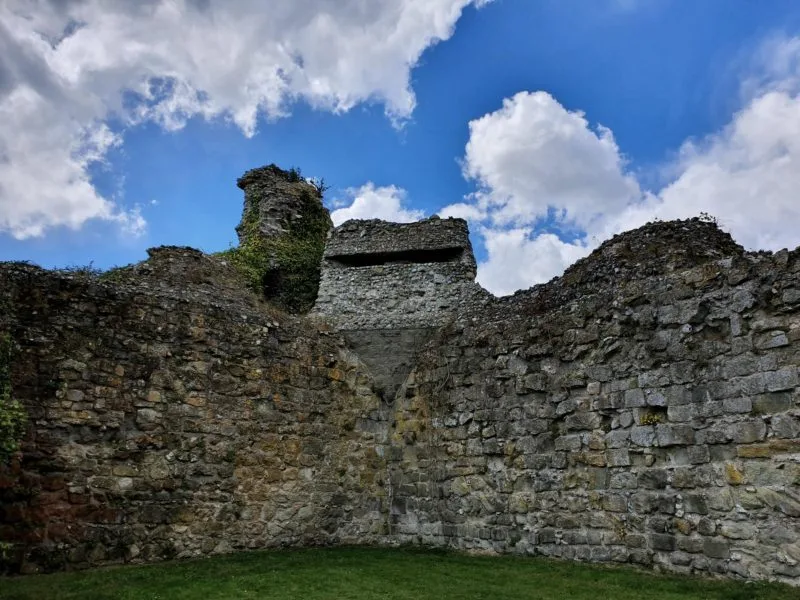
How Much Does It Cost?
We pay for an English Heritage membership annually because we love castle-hunting and exploring the vast history of the UK. If you’re the same and hold an English Heritage membership then a visit to Pevensey Castle is free (our favourite price).
If you’re planning on paying the standard ticket prices then here’s what you can expect to pay (as of 1 October 2022);
- Adult: £7.50
- Child (5-17 years): £4.00
- Concession: £6.50
Pevensey Castle Opening Times
Opening hours can differ at points throughout the year however regular hours are 10 am to 5 pm throughout the week.
Helpful Tips
Parking
I’ve updated this section following some helpful feedback from the local Pevensey Council to state that the parking facilities, located approximately 300m from Pevensey Castle, now offer card and coin payments via a mobile parking app. We’ve been informed that the parking fees go towards the maintenance of the Pevensey Court House Museum, which is free to visit.
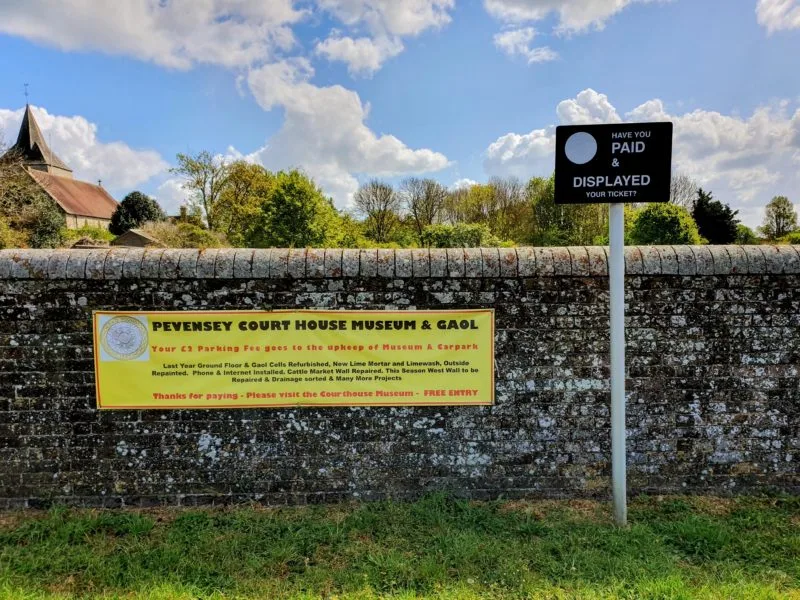
Weather
I wish we brought some extra layers because despite blue skies it was windy and even rained for a bit! So bring a coat and be prepared for a little rain.
Verdict: Is It Worth Visiting?
Absolutely and without a shadow of a doubt. In other words, yes it is.
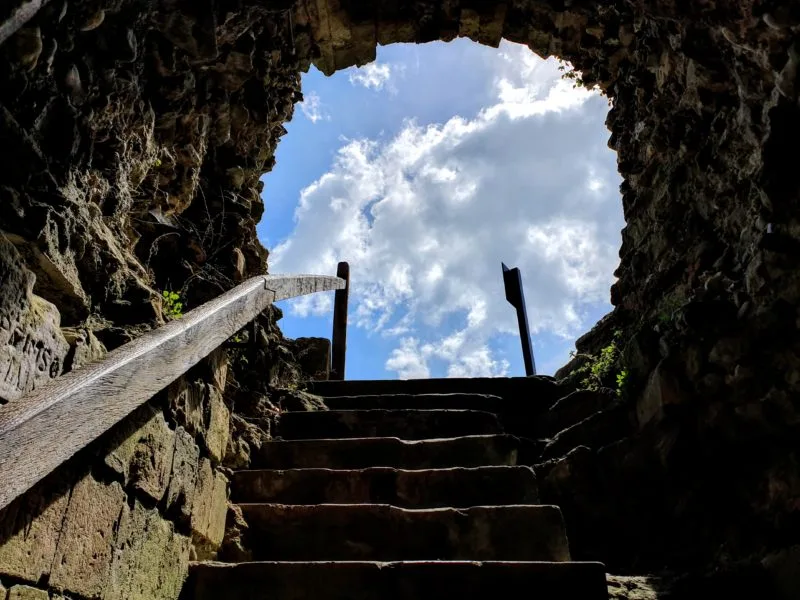
Final Thoughts
If you’re looking for a short weekend break from London or if you’re visiting the UK and want to go Castle-hunting then a visit to Pevensey Castle is a must for both reasons. A visit to Pevensey Castle provides the opportunity to explore 5th century Roman ruins, stand on the same site where William the Conqueror and his army first arrived from Normandy before marching 10 miles to battle King Harold for the English throne.
The question isn’t IF you should go visit Pevensey Castle, the question WHEN are going to explore it?
The Parking machine for the Castle Car Park is being upgraded for this season and will take coins and credit cards and payment by parking App. Car reg numbers will also be recorded, The charges are £2 for up to 4 hours and £3 all day. ALL these charges go towards running the Pevensey Court House Museum on the High Street (Which is FREE to visit) and also the unpack of the Car Park. Please do pay as its going to charity !! We will be trying to work out a scheme with local businesses so you may be able to get some your money back on the parking price as well !
Many Thanks R. Slater (Chair) Pevensey Town Trust
Thanks Robert for the updated information.
I really enjoyed finding out more about Pevensey from your post Russell. I love castles so I relished all the detail you included and the photos to illustrate verything. You made the place come alive and now Iwant to go and visit!!
I definitely need a day trip here now!
Makes for a great day trip from London! Let us know when you get there
This looks like a cool one to visit. I really appreciate the train info since I\’m still terrified to drive over there. Knowing that it runs hourly is good to know! I think my favorite part is how old it is and yet it still has a place in modern history. I mean, why wouldn\’t you want to use it? It’s there and does the job.
It’s really not that scary to drive on big motorways, central London is a different story